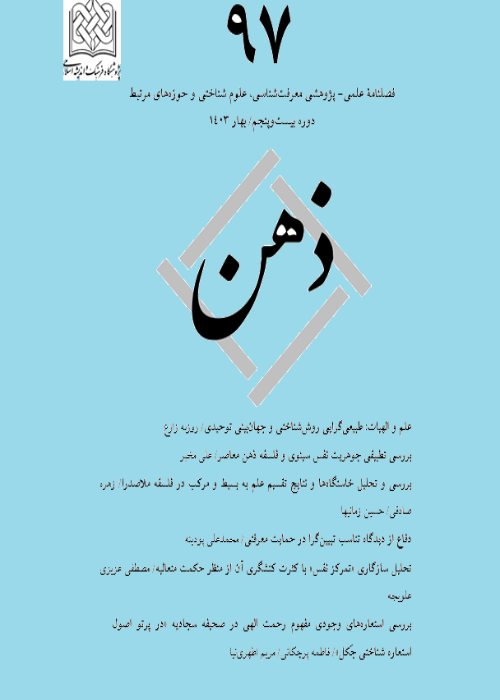In search of the framework to communication and interaction between epistemology and psychology
As science grows, the branches of science distance themselves from the main stem and sometimes, as necessary, re-establish themselves in the position of connecting and interacting with other branches. After the separation of psychology from philosophy, many attempts have been made to establish links between epistemology - as one of the main branches of philosophy - on the one hand, and empirical psychology - as one of the separate branches of philosophy - on the other hand. Using analytical-descriptive methods the aim of the present study is to explain new paths based on psychological texts that allow the closeness of two independent branches of epistemology and psychology more than before; paths that can be less traced in the domestic research literature. In this direction, what is more intended is to send epistemological services to psychology, not the other way around. Theories and findings of psychology, as one of the disciplines of the humanities, are more subservient to cultures, values, and anthropological and epistemological foundations; therefore, epistemological services to psychology will be important. In this article, while discussing the possibility and necessity of exchanging communication and services between these two fields of study, four communication paths have been specifically identified and examined in more detail, which are: explanation and critique of psychological theories, explanation and critique of research methodology, explanation and critique the norms and tools used in psychology and finally critique the common grammar in psychology. It is said that in the nineteenth century, empirical psychology was separated from philosophy. Bishop and Trout, narrate the separation of the two. For much of the history of Western reasoning, from Plato to Kant, psychology has been a part of philosophy. But in the mid- nineteenth century, psychology created a rift, and divorce was introduced with Wundt's laboratory. Since then, philosophy, like a failed lover, has been trying to revive this relationship (Bishop & Trout, 2005). Psychology took the empirical path and philosophy as an intellectual and argumentative science continued its independent path. After decades of apparent separation, signs of a connection between the two areas reappeared. The simplest argument is that it is not possible to find a well- known psychologist who does not adhere to any kind of philosophical thought or theory just for the sake of his positive or negative attitude towards philosophy; nor is there a psychological school that does not presuppose some philosophical principles (Hatami, 2010). The reconnection between philosophy and psychology occurred especially in the most central branch of philosophy, epistemology. For example, when epistemological issues such as the process of feeling, memory, imagination and concept were considered by psychologists, the two approached each other and began their interactions (Fa'ali, 2000, second edition, p.39). Another event that brought philosophy and psychology closer together was the evolution of the philosophy of science, in which psychology sought to move beyond the positivist empirical science. The views of Thomas Cohen, Lakatosh and Feyerabend were effective in this regard (Azarbayjani, 2012, pp.14-15). Breaking the barrier of empiricism spontaneously paved the way for interaction with other non-empirical realms, especially philosophy. However, it should be noted that establishing a link between philosophy and psychology, and especially between the central branch of philosophy, namely epistemology and psychology, as it may seem, will not be an easy task. Goldman (1985) emphasizes that many attempts have been made to make the connection between epistemology and psychology, but little agreement has been reached on how such a connection should be made. Therefore, the study of ways to link these two areas of study should continue. Another proof is the book "Difficult Chapters in the Relationship between Psychology and Epistemology", published in 1989, edited by Hess. As the title suggests, linking these two areas, while necessary, is not an easy task.Leading study is an attempt to clarify the communication between epistemology (as one of the branches of philosophy) with contemporary psychology.
- حق عضویت دریافتی صرف حمایت از نشریات عضو و نگهداری، تکمیل و توسعه مگیران میشود.
- پرداخت حق اشتراک و دانلود مقالات اجازه بازنشر آن در سایر رسانههای چاپی و دیجیتال را به کاربر نمیدهد.


